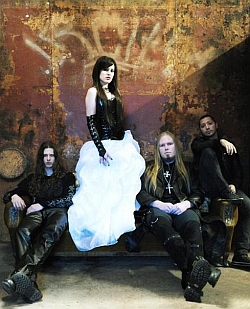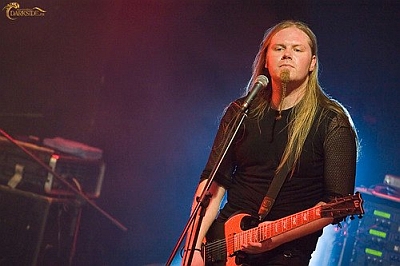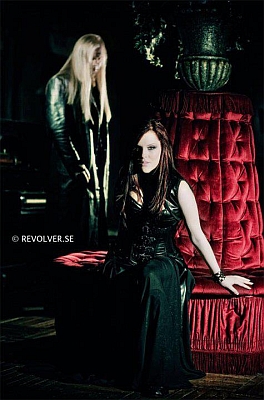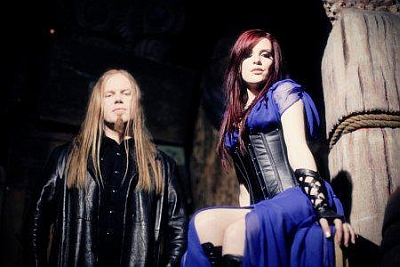Sirenia Interview 2013
Sirenia Interview 2013
performed via skype
Sirenia has been one of the major Gothic metal acts for a long time. Morten Veland began the band after leaving Tristania a number of years ago. The band’s latest release, Perils of the Deep Blue, has reviewers raving. Many say this release takes the band back to the earlier releases with a dark, brooding sound, featuring a solid death metal vocal combined with a skilled soprano, all over the traditional choral and symphonic sounds that made the band one of the largest draws in Female Metal. Sonic Cathedral’s Doctor T talked to Morten Veland about the new release, and Gothic metal in general. 
Doctor T: I’ve read a number of comments you’ve made about this release. You’ve talked about the effort, the commitment, the hard work. I’m hearing some music that takes me back to the first two releases, but with a bigger sound. Could we talk about the sound, the music first? How has that moved forward?
Morten Veland: Yea, I definitely feel the same way and it was the intention with this album, we wanted to go a little bit back to our roots musically, we wanted to bring in more of the elements we had back then, you know, typical longer songs, more complex arrangements, more of the extreme elements of the music. With the previous three albums the focus was more on the melodies, the female vocals, writing shorter songs and hook lines, stuff like that. With this new album we wanted to go more back to the original format but at the same time we wanted to add some new and different stuff, you know, that the fans didn’t hear from us, so I feel that this new album is a nice combination of the past and the new for Sirenia in a way.
Doctor T: Sirenia pretty much defines Gothic to many of us. This is Gothic music to me; do you define it that way?
Morten Veland: Yea, people were fast to define Sirenia as a Gothic metal band and to me that’s OK, but at the same time I think that Sirenia has a lot more. It’s a lot more than just being a Gothic metal band I think. As our musical concept pretty much spins around combining metal music with a lot of different styles, we put a lot of practical elements in there with the orchestration, choirs and we use stuff from industrial, we use some rock elements and we kind of blend in all kinds of stuff in our music. It’s part of our idea and our concept is to have a musical sound that is based on variation and musical diversity.
Doctor T: Let’s talk about the music. You use a big sound, metal, choirs, large symphonic components, multiple vocals. What’s it take to make this kind of music?
Morten Veland: Well, it takes a lot of time. That’s for sure and it takes a lot of ideas and as for me I see it as a very interesting and challenging thing blending all these different elements into our music with big orchestral arrangements and setting up choirs with a lot of harmonies and putting all these things together is for me what makes it pretty exciting and challenging and interesting to work with this kind of music. And, so yea, it definitely takes a lot of time and a lot of work to get these things done right. It’s easy to make a big mess out of the whole sound so if you put the wrong things at the wrong spaces or let the instruments play the wrong parts or whatever. It’s like a huge puzzle and trying to get that puzzle done in a perfect way is why I think its really interesting with this kind of concept that we have with Sirenia.
Doctor T: How do you work the choral and symphonic elements in during the writing process. Are they just another part, same as the guitars and vocals?
Morten Veland: Yea, more or less it is. I mean sometimes when I write a part I start with my guitar and I start building lawyers on top of that, on other occasions I can start and maybe with the keyboard and start making the orchestral arrangements first and then adding all the back stuff with guitars, drums, base and so on. So that’s something I tried to do, something that I do for a reason because it enables me to write with different ideas. If I would pick up my guitar and write every part with my guitar there’s a bigger possibility of getting a lot of the ideas to sound very equal or whatever. So by using different techniques when I compose and write the music I think I’m able to bring different ideas to the table. So it’s helping out a lot with the variation to work in this kind of way.
Doctor T: Do you plan on a musical theme, a general sound for each release? If so, what was your thinking here on Perils?
Morten Veland: Yea, I mean, we still have all the typical elements that are an important part of our sound. We still have the same choir, we still have a lot of the typical elements that we’ve used with Sirenia since the beginning and I think that it’s important from album to album to come up with new stuff and to make variations and improvements to try and improve our style. But at the same time, I think it’s also important to take good care of those elements that are an important part of our sound. So it’s been like time to balance that up, adding new stuff but, at the same time, keeping the important typical Sirenia elements in our music.

Doctor T: You’ve gone through a small village of female vocalists and seem to have become comfortable with Ailyn. How has that come about?
Morten Veland: Yea, I guess we weren’t so lucky with our female singers in the past, they all left for different reasons. But you know, when we finally found Ailyn it worked. It was a huge process going through all the applications that we got, we spent like half a year, just making the arrangements, arranging all the auditions and everything and going through letters, applications, listening to demos, tons of stuff. But, at that point, we really wanted to take our time to make absolutely sure we made the right choice. We wanted a singer that, first of all, had the singing ability, that had a voice that fit to our music. We wanted a singer of course, with a strong and cool image and we wanted a singer with the right personality and the drive and the will to put the time that was needed into the band. A singer that wanted to work hard with the music, trying to achieve stuff, to work hard to improve the band and, I definitely think that we found that with Ailyn. And she’s now recording the third album with us. Being with the band with quite some years that proved that we made the right choice for the band and that’s something that makes all of us very happy.
Doctor T: Lyrically this release seems to include some additional languages. I’m no linguist but I do know the Spanish and assume that is Ailyn’s idea. What are the other languages and how did that evolve?
Morten Veland: Yea, usually we write in English and for the previous album we did bonus material in Spanish but not all those tracks were included in the final release. But for this new album we wanted to do something new and different so we have made two songs in Norwegian which is the first time for us to ever do that, and, one of those songs also have those two parts in the middle and towards the end that have Ailyn singing in Spanish. I think I had an idea of doing that part in French but we didn’t have the right contacts to do it. So, Ailyn had the idea to do it in Spanish and I gave her the lyrics and she translated them into Spanish and that worked out really well. We were still able to get those contrasts that we were looking for. I think it worked out really well; the song is something clearly different from what Sirenia was. It feels great to have some songs that are unique and interesting as well.
Doctor T: Pues, me gusta al espanol mucho. I’m very happy to see the Spanish in there. I can’t even get the Spanish bands to sing in Spanish so believe me; I’m not going to complain about this, I like it a lot.
Sirenia doesn’t do happy music. It’s pretty dark, pretty intense. What drives that writing direction?
Morten Veland: It was always that way for different reasons I guess. I always like that kind of music and it was very important to me that the lyrics need to go hand and hand with the music together as a concept. So it was a natural to write about it, to focus on the darker aspects of life and mankind these things in general. It’s also a good way to get all the negativity out of my system, writing about it, making songs about it and composing music that expresses these kinds of feelings. Its a way to process it and get it out of the system in a way.
Doctor T: Although there are some similarities between Perils and previous releases, this one is different. One writer said this was the equivalent to Nightwish’s Once in terms of significance. I’d probably agree. What are your thoughts?
Morten Veland: I also agree that we’ve been able to make something special. With this album I think it’s a very fun album. We worked really hard to improve ourselves and to make an album that had great variety. You know, I think eleven songs, or 13 songs on the limited edition, and all songs are different. They all have their unique expression, their unique identify. And I don’t think there are any weak links on the album, we worked extremely hard with every note, every performance to make this album the strongest, the best album we ever did. Really, in those terms, I feel we succeeded. I think with this release, we’ve been able to take the band to the next level.
Doctor T: Having some experience in writing lyrics I wonder how you do yours. They can’t be based entirely on experience, what is the driving force, where do you find the lyrical inspiration?
Morten Veland: Yes, they come from life in general, things that happened to me or people close to me or even being in the studio composing music because I always compose the music first and then write the lyrics afterwards. It’s just the feelings and emotions already there in the music, which also inspire to writing the words afterwards.

Doctor T: You were heavily involved in the development of this work, guitars, keys, vocals, production, pretty much everything but sweeping the floors. How do you handle all that complexity and how do you keep things straight?
Morten Veland: Yea, I’ve been the composer for all the music for the band. I can have a vision for how things can turn out from the very beginning and I try to work towards that goal and for sure, sometimes along the way I come up with some new ideas and I kind of tweak the original idea, always trying to perfect it and take it to the best possible direction. But since I compose every note on the album I know where things should go and after doing this for twenty years I also have some experience composing and working in the studio and all these things so I am able to take the music where I want to take it. I make it sound the way I want it to sound.
Doctor T: The staff at SonicCathedral has often argued about what constitutes “Gothic” music. If anyone knows, it’s probably you. What does Gothic music mean to Morten Veland?
Morten Veland: Yea, that’s a difficult question to answer but to me, I always think Gothic metal music would obviously include the foundation of a metal band but then adding a lot of different elements, symphonic elements, the female vocals and the keyboards also create contrasts to the typical metal sound. Using instruments, violins, piano, things like that, instruments that have a lot of feeling and atmosphere to provide that melancholic atmospheric sound was something that I always related to the term Gothic metal. You know, I think others might have a different opinion on that, I have no idea actually, but, for me personally that was how I saw Gothic metal.
Doctor T: There is a limited Gothic scene in the US, we’re more into other things. How does the Gothic music scene represent the Gothic lifestyle in your part of Europe, or does it?
Morten Veland: Ahh, well, that’s also a difficult question to answer. And ah, I guess there is no good answer to it. It depends from person to person. There is no Gothic society, no Gothic clubs maybe there is in some other countries a good Gothic scene. Yea, it is difficult to give a good answer to that question but in Norway there is no Gothic scene, there are Gothic bands but that’s pretty much where it ends.
Doctor T: Your music tends to be evolutionary. There are new developments on a regular basis. I don’t know how you top this one, any plans, what’s next?
Morten Veland: Right now it’s finishing all the promo stuff, the interviews promoting the album but we’re also looking at the touring possibilities. We have already set up a mini tour in Russia working with other projects as well. We will start touring this Autumn and start performing the new song material. I think pretty much the next year for Sirenia will spin around making shows, rehearsing and making more interviews to promote the new album.
Doctor T: I rather liked the more traditional male vocals on this one but certainly hope it’s not a forecast that sees the end of the harsh vocals. How do you see this evolving for Sirenia?
Morten Veland: No, I think the harsh vocals have always been an important part of the sound and our musical concept. On some albums we toned down that element a bit and didn’t use it that much. But all our albums the harsh vocals were there, we never excluded that element. On the new album it’s back, definitely a lot more than the last three albums, that’s for sure and yea, it’s always hard to predict the future but I really can’t see Sirenia without that element. Some albums we use it a lot, some we use it less, it has always been there and it will always be there for the future as well.
Doctor T: I certainly hope so. How do you plan to do this material in a live environment. Do you enjoy live performances?
Morten Veland: Ah we will just continue to make the performances as we always have. Obviously orchestral parts and choirs, stuff like that will have to come from the sampler as it obviously won’t be financially possible to do it any other way. But we will continue as we always have, and rehearse a lot and make sure we can perform the new material in the best possible way for our fans in our future shows as well.

Doctor T: Any final comments to your supporters here at SonicCathedral.
Morten Veland: I would just like to suggest to our North American fans we in Sirenia wanted to come to America to tour for years and years but it has proved difficult to realize that. But I want you to know that we’re working hard to making that possible for the future. So I really hope that we can make it over there to do some shows in the near future.
Sonic Cathedral would like to thank Charles Elliot of Nuclear Blast for arranging the preceding interview. Look for the release of Perils of the Deep Blue in July, 2013.
